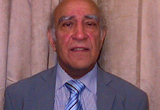 As a follower of Gandhi, I was always fascinated by the subtitle of his autobiography—”Experiments with truth.” Gandhi noted, “Far be it for me to claim any degree of perfection for these experiments. I claim for them nothing more than does a scientist who, though he conducts his experiments with the utmost accuracy, forethought, and minuteness, never claims any finality about his conclusions, but keeps an open mind regarding them” [1].
As a follower of Gandhi, I was always fascinated by the subtitle of his autobiography—”Experiments with truth.” Gandhi noted, “Far be it for me to claim any degree of perfection for these experiments. I claim for them nothing more than does a scientist who, though he conducts his experiments with the utmost accuracy, forethought, and minuteness, never claims any finality about his conclusions, but keeps an open mind regarding them” [1].
Around Christmas 2012, I was preparing for a major lecture tour of India, where I would be giving workshops in neuropsychology and behavioural neurology along with other colleagues from Britain and from India. I thought of the triad of Gandhian principles—truth, love, and self sacrifice. What about carrying out an experiment in “love,” or what may in this context be better termed “compassion?” Could I use this lecture tour to carry out such an experiment?
For many years I had been both troubled and preoccupied by the fact that there is often so much surplus and waste in the world in the midst of so much want and need. As I looked at the books I was reading to prepare for my lecture tour, I thought, what about “surplus” in the case of books? I had an extensive library of books in my field, neuropsychology, and I knew there were some earlier editions of a book that were very good, but which I no longer needed. I had duplicate copies of a few books, etc. They were just taking up valuable space. How about getting these books together, along with similar books that my colleagues may have, and shipping them to India during the conference, could we not sell them off at a bargain price and give the proceeds to a local Indian charity? I consulted the local workshop organisers in India, and they were enthusiastic about the idea.
I gathered together my own set of surplus books, around 20-30 in all and contacted members of my academic and professional societies. One colleague kindly sent over two crates of books. I ended up with around 60 books.
The first workshop was a six day affair in Calcutta. We displayed around 30 books on a table outside the conference hall. Along with a few local Indian colleagues, we quickly priced the books—most were priced between 100 and 1000 Rupees (approximately £1-12). We put a large post-it on each book, and we asked delegates to put their names on a book they fancied buying. On the last day of the workshop, the books that were selected by a single delegate were sold to that person. Those books that attracted several buyers were then raffled, with one of my UK colleagues picking the lucky name “out of a hat.”
In Bangalore, the location of the second workshop, we adopted a slightly different strategy. Instead of having the books on display for several days, we simply had them on display over a lunch break and sold them on a first-come, first-serve basis. We sold most of the books in the lunch break, with eight remaining. At the start of the after lunch conference session, we simply auctioned off these remaining books, starting at 100 Rupees. We sold them all in no time!
In Calcutta, we raised around 20,000 Rupees and I topped this with a personal donation of another 20,000 Rupees, making 40,000 Rupees in all (around £500). We donated this money to the Acid Survivors Foundation of India (www.asfi.in). A doctor from the foundation accepted the money, and gave a short presentation of the work they do to help acid survivors, usually young ladies who are terribly disfigured as a result of having acid thrown in their faces. In Bangalore, we raised around 16,000 Rupees, which I topped up with another 9,000, and we thus donated 25,000 Rupees (around £312) to a local dementia centre which is doing pioneering work, offering residential, day care, and community based care for patients with dementia.
It was a simple idea that worked! We achieved a “triple whammy”—my colleagues and I got rid of books we no longer needed, professionals in India got books they valued and at a bargain price, and a local charity benefitted from the book sales. Conference delegates thought it was a great idea and enthused about it. We embodied all three of Gandhi’s principles in one go—we promoted “truth” via the books, we promoted “love” (giving books away cheaply, donating proceeds to charity), and it was a form of “self-sacrifice” in donating books that belonged to us.
Narinder Kapur is a visiting professor of neuropsychology at University College London.
1. Gandhi M. (1927, Penguin Edition, 1982). An Autobiography. Or the Story of my
Experiments with Truth. London: Penguin Books.
See also:
Personal view: The NHS could learn much from Gandhi’s teaching
